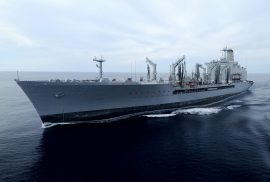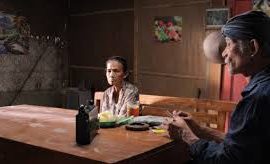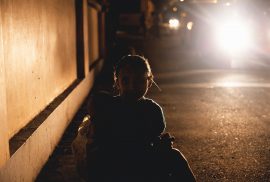The South China Sea (SCS) is waters area extending from the Southwest to the Northeast, bordering on the south by 3 degrees south between Sumatra Island and Kalimantan Island (Karimata Strait) and the North is bounded by the Taiwan Strait from the north end to the directions of Fukein beach, China. The area of SCS itself is estimated to reach 4 million square kilometers with four sub large islands namely Paracel, Spratly, Pratas and Macclesfield (Asnani Usman and Rizal Sukma, 1997). SCS which is estimated to have great potential in marine biota, tourism, fishery, oil, natural gas and even navigation makes many countries try hard to get legality over SCS.
It is undeniable that Southeast Asian films have their own position and have gained the spotlight of the world through various forms of appreciation. Films like “Kinatay” by Briliante Mendoza from the Philippines won the best director category at the Cannes Film Festival in 2009. In 2010, there was a movie titled “Uncle Boonmee” from Thailand made by director Apichatpong Weerasethakul who won the Palme d’Or in the same event . Last year 2016, the same award was awarded to Indonesian filmmakers. The work of Wregas Bhanuteja titled “Prenjak” became the best film on this prestigious film festival . The above facts serve as evidence of Southeast Asian cinema’s success in taking a position on the world cinema map.
Southeast Asia is in the spotlight when by the end of 2015 the region officially enforces the ASEAN economic community which is one of the three pillars of the ASEAN Community. But for the international community, Southeast Asia is a region which its knowledge is rarely studied, so that a question arises about what is meant by Southeast Asia? Is Southeast Asia merely an area consisting of countries that are rich in culture, rice-eaters, electronic appliances lovers, and prioritizing family values?
SEA Movie in cooperation with Minikino held a screening with title “Indonesia Raja: Yogyakarta”. Indonesia Raja itself is a Minikono program in the form of interregional collaboration between regions / cities in Indonesia conducted periodically, 1 (one) time each year in the form of short film program exchange.This year there are several filmmakers from several cities participating in this activity and one of them is Yogyakarta.
The screening (16/08/2016) featured a compilation of four short films. Semalam Anak Kita Pulang (Adi Marsono / 2015), the film with duration of 12 minutes and 41 seconds became the first film of the Indonesian Raja movie series . Adi photographed the reality of life in the current sense that is no longer attractive to the younger generation of job seekers. Through the mother who missed her daughter, this film shows the anxiety of a mother who can not meet her child, even her only daughter went to another place (city) to try her fortune. Nilep (Wahyu Agung Prasetyo/ 2015), tried to play “good” and “bad” from the perspective of children, which leads to the notion that, presumably, these two perceptions are still childish in the context of Indonesian society. Sasi Takon (Wawan Sumarmo / 2015), a short film that tells the story of the impact of taboos that are violated and it causes unrest that arises from a child’s question to his mother. This film records the social conditions of society through different sides. The fourth film, Bawang Kembar (Gangsar / 2015) is an animation film with a duration of 18 minutes. The interesting thing about this film is its use of mythical figure of Javanese as well as moral values and goodness that comes from even a figure who is considered evil .
Southeast Asian countries have their own capital punishment regulation, actually all of them have it until Philippines and Brunei abolished their Capital Punishment. Most of the Southeast Asian countries have the same capital punishable crime such as; drug trafficking, drug possession if considered as organized crime or exceed some quantity limit, terrorism, murder, treason, espionage, war crimes, against humanity, and also genocide. However, each county has certain differences in the regulation.
In 2001, the famous Hollywood actress, Angelina Jolie, visited Cambodia whilst she was featuring in her latest box-office film, Tomb Raider. Whilst in Cambodia, Angelina fell in love with a seven month old baby. A year later, Angelina returned and officially adopted a baby named Maddox. Angelina has since admitted that she had no desire to have children before meeting Maddox, and meeting with the children at a school in Cambodia. Angelina is now a mother of six, with three of her children having been adopted.
Have you ever been to Borobudur during Waisak? Or went to Thailand and saw a lot of shops which provide the needs of the monks? Usually you need to provide extra money in your wallet.
Yes, the religion rituals and cultural tradition now have been used by the business people to get bigger profit under the pretext of culture-based tourism. Several places of religion rituals implement a system of admission, or the use of religious attributes that require us to pay the rent. In addition, the economic effects also be felt by its surroundings, like foods business and parking. These are what commonly called commodifications, which come from the words commodity and modification. Most of the experts in contemporary usage, define commodities as any goods or services associated with capitalist production and can be found as a result of the growth of capitalism, this is the inheritance of Karl Marx and the early political economy (Appadurai, 1986). Along with Karl Marx, Greenwood (1977) also stated that everything that is sold is assumed as a commodity, including culture. Modification means changing. If it merged with the meaning of commodity, commodification means changing a stuff to become economical commodity. Shepherd (2002) stated that along with the increasing demand of tourism, commodification of culture cannot be avoided because the tourists want to feel different cultural experience as theirs. The debate is warmly discussed by the public and cultural and religion observers.
One of the consequences of diversity in Southeast Asia is the emergence of many dynamic and never-ending questions to discuss. One question that keeps us thinking is, how does this region survive with hundreds of local beliefs and at the same time apply public policies regarding religious rules? Dr. Dicky Sofjan discussed the answers to this question in the SEA Talks # 8 discussion, on the afternoon of Thursday, June 16, 2016. In his presentation, Dr. Dicky explained that the logic of religion in society is often different from public policy. This can not be separated from the influence of the democratic system adopted by almost all countries in Southeast Asia. According to him, the application of democracy raises the existence of unintended consequences, as well as the phenomenon of abuse of laws, decentralization that causes inequality, and also multi-interpretation of the beliefs of one group. On the other hand, the state also has great authority through the prevailing system. Like Malaysia, which applies Islam as a national religion and is listed in the constitution. This rule then legitimizes the expulsion of Ahmadiyah worshipers in one of the mosques in Malaysia as well as rules that lead to minority discrimination.
One of the consequences of the diversity that exists in Southeast Asia is the emergence of many dynamic questions that never expires to be discussed. One of the questions we keep thinking about is, how does this region survive with hundreds of local beliefs and at the same time impose public policy on religious rules? Dr. Dicky Sofjan discussed the answer to this question in SEA Talks # 8, on Thursday afternoon, (16/06/16). In his presentation, Dr. Dicky explained that the religious logic in society is often different from public policy. This can not be separated from the influence of the democratic system adopted by almost all countries in Southeast Asia. According to him, the application of democracy leads to unintended consequences, such as the phenomenon of misuse of the law, decentralization that causes inequality, as well as multi-interpretation of the beliefs of one group. On the other hand, the state also has great authority through the prevailing system. Just as Malaysia that applies Islam as a national religion and lists it in the constitution. This rule then legitimizes the expulsion of Ahmadiyah pilgrims in one of the mosques in Malaysia and also the rules that lead to minority discrimination.









